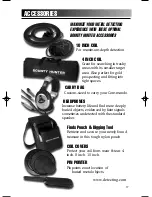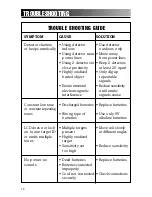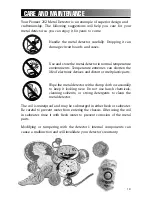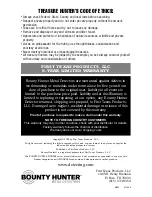
15
IN THE FIELD TECHNIQUES
After selecting your operating mode,
swing the search coil gently side-to-
side, slightly overlapping each sweep
as you move forward. Make sure you
keep your search coil approximately 1
inch above the ground as you search.
Raising it in the sweep, or at the ends
of your sweep, will cause false read-
ings. Move slowly; hurrying will only
cause you to miss targets.
Most good objects will respond
with a good repeatable signal.
If a signal does not
repeat after swinging
the coil directly over
the suspected target a
few times, it is more
than likely trash
metal. False signals
can be caused by
trashy ground,
electrical
interference,
or by large
irregular
trash
objects. These signals are easily
recognized by their often broken or
non-repeatable nature.
The Pioneer 202 is a very sensitive
and deep-seeking detector. It will
respond loudly to many targets that
other detectors would only detect
with a weak signal. Because of
this, trash-induced signals and
other sources of interference may
cause signals that seem confusing.
The key to managing these false
signals is to dig only those targets
that emit a strong repeatable signal.
As you sweep the search coil
back and forth over the ground,
learn to recognize the difference
between the signals that occur at
random and signals that are
stable and repeatable.
When searching very trashy
ground, it is best to scan small
areas with slow, short overlapping
sweeps. To prevent erratic signals
and difficult pinpointing in trashy
areas, consider purchasing the
Bounty Hunter 4-Inch Gold
Nugget Coil System.
WHAT
READS
LIKE THIS
…MAY
ACTUALLY
BE THIS




































